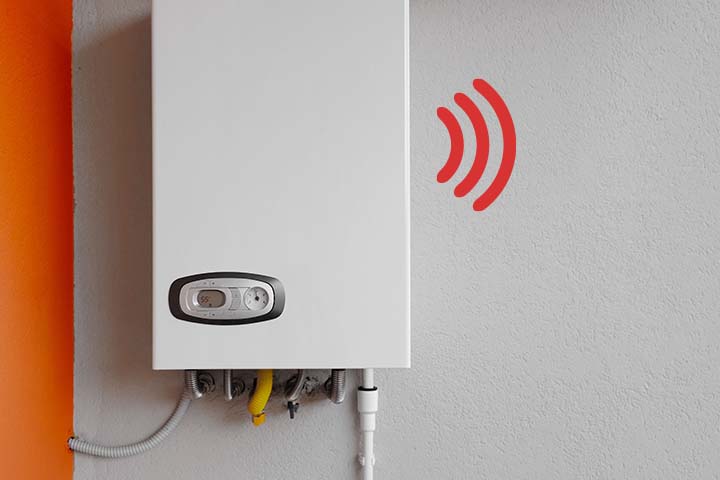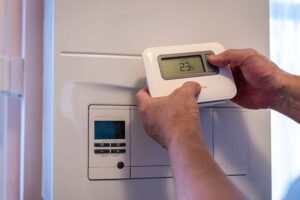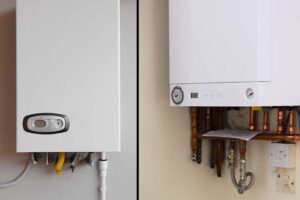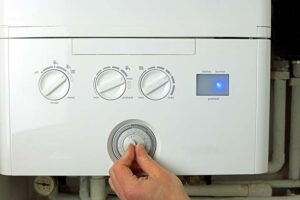A boiler is supposed to heat your home without any noise. Nevertheless, a teasing sound coming from a boiler means something is not right within the heating system. Most houses in the UK have central heating that operates every day in winter.
Odd noises can make you feel alarmed, and it is a good thing that you check them frequently. A boiler that is making a noise can be more than a slight inconvenience.
It may indicate low water pressure, limescale, air getting trapped, or a broken pump. At times, the boiler might produce unusual sounds that need a Gas Safe expert to look into. This manual demystifies the typical noises, why they happen, and how you might rectify them.
Common Boiler Noises You Might Hear
There are many reasons why your boiler starts making sounds. Certain noises could be minor issues, and others could indicate the boiler is faulty. Normal noises from your boiler include:
- Banging noise – A loud knock inside your boiler or pipes.
- Whistling noise – Often compared to a kettle boiling.
- Gurgling noise – Bubbling sounds in the heating system.
- Humming noise – A low drone that continues.
- Vibrating noise – A boiler making a loud vibrating noise that can be worrying.
- Buzzing noise – Electrical humming or faulty parts causing buzzing.
- Whooshing noises – Air or flow of water rushing through pipes.
These common noises help to inspect your boiler. Each one has a likely cause for concern.
Boiler Making Banging Noise
A boiler making a banging noise is very common. This bang often happens due to trapped air in the system. Air in the system prevents smooth water flow around your boiler. It may also be sludge blocking pipes inside your boiler.
Leaks from the pipe or fittings will rattle and gurgle when the water is heating. A pump that is not working properly and is not circulating the water can also produce a knocking noise. Always bleed the radiators before, allowing trapped air out. If the sound is persistent, contact a professional engineering expert.
Boiler Making Noise Like an Aeroplane – Is It Dangerous?
Sometimes a boiler making noise like aeroplane engines is reported. This usually means the pump or fan inside the boiler is faulty. The buzzing or running water sound can also have this effect. Despite the fact that the sound is unusual, the sound is not necessarily dangerous all the time.
However, the high sound levels like this can be alarming. A Gas Safe-registered engineer should inspect your boiler quickly. A faulty boiler that makes noises like aeroplane engines should never be ignored.
Boiler Making Noise When Heating On
If your boiler is making a noise when heating on, trapped air is often the common cause. The heating system may have low boiler pressure, making noises more likely. Radiators may rattle as air passes through.
The boiler could be making a gurgling noise if the water pressure is uneven. Release air from the radiators if you hear the knocking through aggressive bleeding. Get a heating engineer to your home if the noise is really loud, banging that can be connected with the heated water.
Boiler Making Buzzing Noise
A boiler making a buzzing noise or a humming noise may point to electrical problems. The fan, pump, or transformer inside the boiler may create buzzing sounds. Loose wiring around your boiler can also create noise.
Buzzing is not always dangerous, but it should be checked. An engineer can test the electrics and stop the noise from your boiler.
Boiler Making a Loud Vibrating Noise: Is It Dangerous?
When a boiler is making a loud vibrating noise, it may shake your walls or floor. This can sound alarming. The cause is often a loose part within the boiler or poor installation. Vibration may also come from high water flow.
The boiler making a loud, vibrating noise is never safe to be left alone. A competent heating engineer should be summoned to inspect your boiler and have any faulty pump or fittings rectified. If ignored, the problem may damage parts inside your boiler.
Boiler Making Humming Noise
A humming boiler is another common issue. A boiler making a humming noise may be linked to electrical parts. The pump or fan may hum if it is set at the wrong speed. Humming noises may also happen if the boiler pressure is too high.
While the humming noise is not always dangerous, it should be checked. A gas safe engineer can reduce the speed settings and stop the sound coming from your boiler.
Boiler Making Noise When Not in Use
Sometimes you may hear noise when it’s not in use. A boiler making noise when not in use may surprise you. This may happen if air is trapped inside your heating system.
It can also mean water continues to circulate even when the boiler is off. Faulty pumps or valves will cause noise when the boiler is not running. It is the duty of a boiler engineer to look into unusual noises like this.
Boiler Making High Pitched Noise
A high pitched whistling noise is often called kettling. This happens when the limescale builds up on the heat exchanger. In hard water areas, minerals coat parts inside your boiler. The flow of water is blocked, and steam builds up.
This makes unusual noises like a kettle whistle. Kettling reduces efficiency and can shorten the life of your boiler. A professional heating engineer should clean the system to remove limescale.
Combi Boiler Making Noise When Running Hot Water
A combi boiler making noise when running hot water is a frequent issue. This can be caused by limescale or air in the system. The boiler pump may also be struggling to circulate water.
Noises when hot water is being run indicate that there could be jammed pipes. In case you hear loud and bubbling sounds while using hot water, this is a clear sign that your combination (combi) boiler is in need of maintenance.
How Can I Prevent the Boiler from Making Such Harsh Noises?
One could seek more information on how the boiler could be prevented from making noises that tend to disturb others in the setting. One can start with a small thing. Radiator bleeding removes the blocked air.
It is a good idea to examine the boiler pressure and increase it if it is low. To avoid the rattle near your boiler, wrap pipes with lagging.
If the rattles persist, a Gas Safe-registered engineer must review your boiler. They may recommend a full service on your boiler, system flush, or even a new boiler if yours is very old indeed.
Regular service on your boiler prevents strange noises. Following your boiler manual may also guide you.
Preventing Future Boiler Problems
The simplest way to eliminate noise from your boiler is to prevent it. An annual boiler service makes the heating system safe and in good condition. A heating engineer can inspect the boiler pressure, pump, and identify issues early.
In places with hard water, a scale reducer would be a solution for limescale. Sludge is taken out, and water flows better with a system flush.
Apart from that, ensuring regular boiler checks are carried out will minimise the potential for loud noises and also serve to protect your heating water system.
Final Thoughts
Boilers are notorious for being noisy, and they may make noises such as hums, whistles, bangs, and rattles. The most common noise emitted by the boilers is usually due to trapped air, low water pressure, faulty elements, or limescale.
Some of the noises have a set schedule and are not very difficult to repair, whereas others entail something being wrong with the boiler, and the gas safe engineer is required.
Frequently Asked Questions
A banging noise usually comes from trapped air, sludge, or a faulty pump in the heating system. Bleeding your radiators may help.
Yeah, it should make you worry. The major reason might be the motor or pump. A Gas Safe engineer should always come to check the boiler.
It is going to be any one of the following: low water pressure, trapped air, or problems with the system which heats the water up. Usage of the bleed valves on the radiators could be a temporary solution.
Humming or buzzing sounds may point to electrical issues or a pump running at the wrong speed. An engineer should inspect your boiler for safety.
Try bleeding the radiators, checking the boiler pressure very carefully, and insulating the pipes. If this still doesn’t help, then it is high time for you to contact a Gas Safe engineer and schedule a boiler service.







